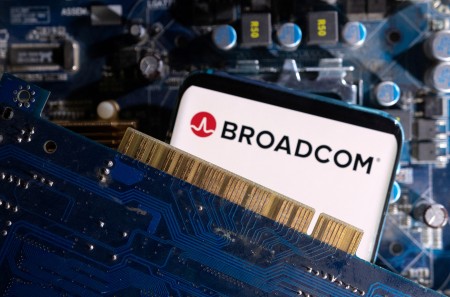 1
1 1
1
(Reuters) – Broadcom’s shares slid about 9% in premarket trading on Friday, after the chipmaker’s revenue forecast spooked investors betting on robust demand for AI chips to drive strong growth.
The chip major posted big declines in revenues from its broadband and non-AI networking divisions on Thursday, offsetting a hike in its forecast for AI chip sales.
Artificial intelligence-linked chips have been a bright spot for Broadcom, as data centers and Big Tech firms invest in infrastructure that can move around the hoards of data used by AI models.
However, analysts said Broadcom’s AI chip business could see uneven growth due to a limited number of customers spending large amounts of capital. Morgan Stanley analysts said AI revenue could be uneven, though it noted still-strong growth this year.
The company’s shares were valued at 25.6 times forward earnings expectations compared to 29.6 for AI chip giant Nvidia and 36.07 for AI networking equipment maker Arista Networks.
Broadcom’s market capitalization, should the losses persist, could drop by about $63 billion from $711 billion as of Thursday’s close.
Other chip stocks such as Nvidia, Advanced Micro Devices and storage chip maker Micron Tech were down between 1% and 2% before the bell.
Revenue from Broadcom’s semiconductor solutions business, which supplies products for data centers, networking and broadband, grew 5% in the quarter ending July from the same time a year ago, but just 1% from the previous quarter.
BOOST FROM AI BOOM
Investor enthusiasm for artificial intelligence has cooled even as Big Tech and chip companies continue to bet on the promise of AI and invest in infrastructure to support its development.
Broadcom has indicated it continues to benefit from the billions of dollars in AI spending, as it increased its sales forecast for AI chips by $1 billion for the fiscal year ending October to $12 billion.
“While we think the AI business deserves a premium, the remainder of Broadcom’s business remains the same slow growth high cash flow business that’s always been Broadcom’s business model,” Wolfe Research analyst Chris Caso said.
Big Tech firms such as Alphabet’s Google and Microsoft have vowed to continue spending on AI as they try to generate revenue off their AI tools through subscriptions and higher-priced tiers of their software.
(Reporting by Akash Sriram in Bengaluru; Editing by Krishna Chandra Eluri)